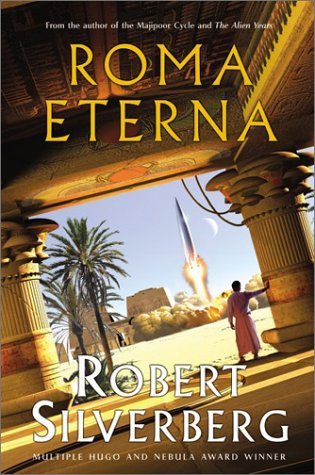Roma Eterna
- Form
- Novel
- Year
- 2003
Publication history
- 2003: Roma Eterna, Eos Hard cover book, 396 pp.
- 2003: Roma Eterna, Gollancz Hard cover book, 384 pp.
- 2003: Roma Eterna, Gollancz Trade paperback, 384 pp.
- 2004: Roma Eterna, Eos Mass market paperback, 464 pp.
Blurb
(From Eos 2003)A powerful epic of alternate history from one of the ture giants of speculative fiction, multiple award-winning author Robert Silverberg
ROMA ETERNA
What if the Empire never crumbled—and the Eternal City reigned supreme for thousands of years?
No power on Earth can resist the might of Imperial Rome, so has it been and so it ever shall be. Through brute force, terror, and sheer indomitable will, her armies have enslaved a world, crushing all who would oppose her in her divine mission of total domination. From the reign of Maximilianus the Great in AUC 1203 onward, Rome thrives through myriad bloody intrigues and corrupt sovereignties that would doom a lesser state. Upstarts and enemies rise and fall, ground beneath merciless Roman boot heels: the prophet Mohammad murdered before his influence can take root; the Mayans in Mexico cruelly subjugated by the invading hordes of the Emperor Trajan VII on their first voyage of circumnavigation.
So it is and so it ever shall be—into a new age of scientific advancement and astounding technologies.
Throughout the many cneturies of Roman rule, one people have suffered and bled...and endured. In the year AUC 2723, at last a faint hope has been born with the advent of a miraculous new industry. For and intrepid band who are called Hebrews, the day is coming when the heavens themselves will be opened to them, and escape from Rome's eternal oppression may finally be possible—as the ships are prepared in secret that will carry the enslaved on their "Great Exodus" to the stars.
A crowning achievement in a majestic career that has already spanned six decades, Robert Silverberg's Roma Eterna is a triumph of the imagination that reveals the acclaimed author at the breathtaking peak of his narrative powers.
Comments
A collection of all the Roma stories, telling the story of an alternate Earth where the Roman Empire never fell. It's a fascinating take on the possibilities of history.
It is interesting to note that the first of these stories to be written is actually the last one in the chronology, and I'm sure when Silverberg wrote it, he had no idea what would come from that speculative spark.
There is not really any sense of continuity, other than the historical one—no characters span between the eras covered, other than when their names are dropped by successors.
The stories, in historical order (with Roman dates), are:
- AUC 1203: Prologue (1203)
- With Caesar in the Underworld (1282)
- A Hero of the Empire (1353)
- The Second Wave (1861)
- Waiting for the End (1951)
- An Outpost of the Empire (2206)
- Getting to Know the Dragon (2503)
- The Reign of Terror (2563)
- Via Roma (2603)
- Tales from the Venia Woods (????)
- To the Promised Land (2723)
Other resources
(None on file)
